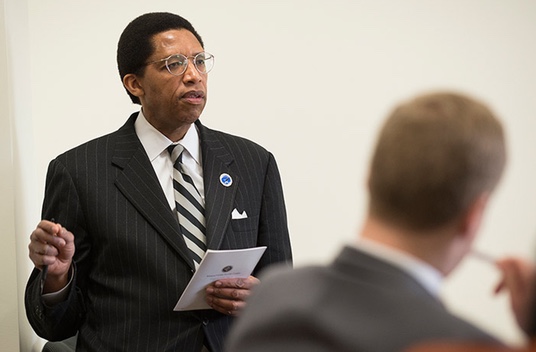
With Cleveland’s murder rate soaring again in 2016, the news that the specialized Gang Impact Unit of the Division of Police will increase threefold, from ten officers to 30 in 2017 is indeed welcome. But not for one minute should anyone think that we can “police” our way out of the problem of black self-inflicted genocide. Since this is a completely new phenomenon — a race of people killing each other instead of members of another tribe, something never before witnessed in the history of the world — we ought to know by now that we’ll have to come up with new strategies to solve the problem.
What we are witnessing — in slow motion, which makes it harder to recognize but no less real — across the country is a sociological and anthropological nightmare of truly epic proportions, and it must be treated as such. We can no longer lull ourselves by privately positing, “Well, next year the murder rate will go back down if we just pray over it.” Wrong.
And mark my words, sooner rather than later the gun violence is going to spread outside of our nation’s ghettos; eventually “death by firearm” is going to begin to occur in suburban shopping malls as young people use social media to mob up and create havoc.
Increasing the number of undercover cops who build cases against known gangbangers — the demographic that accounts for the majority of inner city killings — is a necessary step for crime reduction. But until and unless something substantive is done to prevent youths from joining gangs in the first place (which is much more difficult than simply locking them up, but ultimately much more successful in terms of permanent crime reduction), we will continue to see cycles of incrementally higher and lower numbers of gun deaths per year — figures that tend to average out over deadly decades.
Augmenting Cleveland police efforts in the coming year will be the Neighborhood Impact Community Engagement (NICE) squad that will eventually comprise up to 60 officers who will identify gang members and settle disputes before they turn violent — and ultimately deadly. Cleveland Police Chief Calvin Williams states that people see what’s going on in terms of crime in their neighborhoods but remain silent about the perpetrators. These folks must have been taught this “no snitching” rule by Cleveland cops, who’ve perfected it over the years and religiously stick to it.
My first question is, who the hell sits around all day to come up with these acronyms? Somehow “NICE” and “police” in the same sentence seems incongruous. Secondly, why are we primarily reactive, trying to settle beefs after they’ve happened, rather than making efforts to prevent the beefs from occurring in the first place?
However, while I realize that such police efforts are necessary to deal with the immediate crime situation, ultimately the root causes of substandard education, lack of job opportunities, poverty and low goals have to be grappled with if the problem is to be solved permanently. These are the conditions that cause gang membership to thrive.
Into this mix now steps Duane Deskins, a former federal prosecutor and most recently the prosecutor for the county’s Juvenile Court docket. He’s been appointed by Mayor Jackson to be the new chief of Prevention, Intervention and Opportunity for Youth. While I’m not privy to the parameters of Deskins’ job description, due to the numerous conversations I’ve had with him over the years I think I have a pretty fair grasp of how he envisions his new duties and what strategies he will employ to get the job done.
First and foremost the dangerous youth, those that have bought into the gun culture and therefore are temporarily beyond redemption, have to be taken off the street to protect society and prevent them from being harmed due to their violent lifestyle. I’ve had to look more than one mother or grandmother in the eye and ask, “Would you rather visit him in prison or in the graveyard?” Sometimes a prison stretch can work wonders — I know it did in my case.
The harder part of Deskins’ job of intervention is providing opportunities for these youth that come from communities where unemployment is often more than 50 percent. Many of these budding criminals are engaging in activities such as selling weed and other petty crimes merely to help put food on the family table and keep the lights on in the house. I have real trouble finding fault with the motives for such behaviors, except that I know it can escalate to more serious crimes down the road if not nipped in the bud.
But the simple fact is, most of these youth, if offered an opportunity for a real paycheck, would eschew criminal activity in a heartbeat. Not all of them, mind you, but that’s why we still have prisons. Any youth that doesn’t care to get with the program and prefers to continue a life of crime should be dropped like a bad habit, rushed down I-71 to the closest prison “with the quickness.”
Programs similar to the one Duane Deskins will be attempting to run have proven successful in other cities, albeit still not so much in others, and here’s what causes the difference: The philanthropic and business communities have to step up to the plate and do their share. When they do, programs work; when they don’t, even the best-designed and -administered programs fail.
Mayor Jackson knows that he’s essentially asking his new chief to “make bricks without straw.” The city simply does not have enough jobs to offer these youth to solve the problem. The philanthropic and business communities have to help fill the void, and this is something that is long overdue hereabouts. This parsimoniousness of the “haves” in Greater Cleveland towards disadvantaged young people of color simply must change.
We all know our history, so we know why these youth are in the predicament they find themselves in, and they certainly didn’t do it to themselves. Something was done to them, and it’s past time for those of us — black and white — who are fortunate enough to have had some success in life to spread the wealth a bit by providing real opportunities to those less fortunate, and then to loudly call for locking up those who refuse a helping hand, preferring to pursue a life of criminal activity. But even then we should not throw away the key. We have to become a community of second chances, in deeds as well as in words.
Duane Deskins is the right man, in the right job, at the right time, and he’s going to have his hands full and will need our help — something he greatly deserves. As a society, we no longer are casting about for programs that work; we know which ones do. It’s merely a matter of making violence reduction a top priority in the city and county. We can do this.

From Cool Cleveland correspondent Mansfield B. Frazier mansfieldfATgmail.com. Frazier’s From Behind The Wall: Commentary on Crime, Punishment, Race and the Underclass by a Prison Inmate is available in hardback. Snag your copy and have it signed by the author at http://NeighborhoodSolutionsInc.com